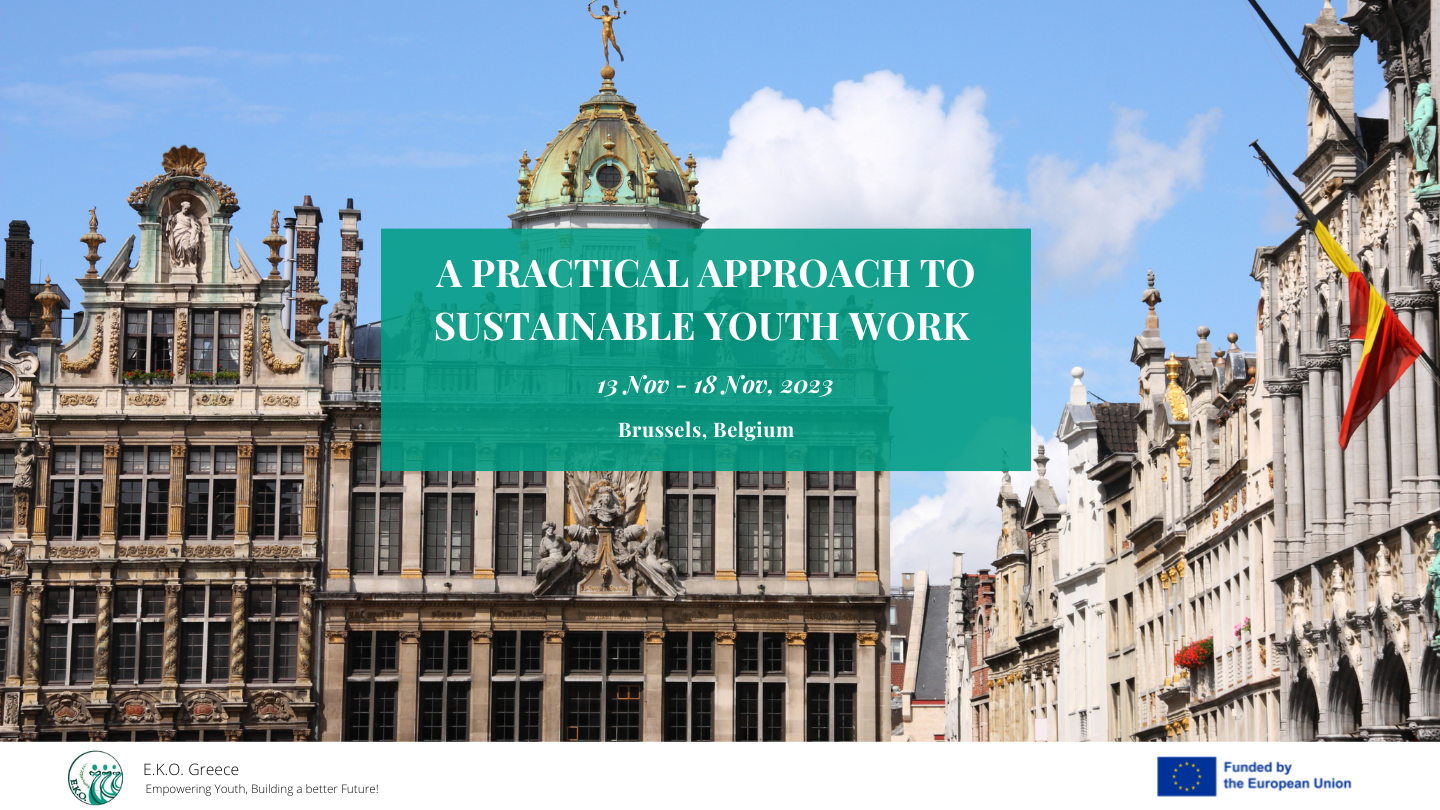
A practical approach to Sustainable Youth work
Training Course, 13 – 18 November 2022

EKO is happy to announce that one more great training course has been successfully completed. The project took place in Brussels, Belgium. During the project 25 youth workers from different countries gathered to learn about sustainability in youth work through different learning methods. The project was implemented from 13th of November till 18th of October 2022 by the host organization YouthProAktiv and participants from 8 more countries including: Belgium, Greece, Georgia, North Macedonia, Armenia, Turkey, Serbia and Slovenia. This training in Brussels brought together youth workers from around Europe to enhance their knowledge and skills about sustainability and methodologies to incorporate the acquired tools and resources to youth work.
The main objectives of the project:
– To increase the knowledge and the practical competences of youth workers on sustainability issues and practices.
– To increase the sustainable and greener capacity of youth work, preparing youth organizations to better incorporate green policies and behaviors in their daily work as a positive example for the youngsters they work with.
– Raising youth worker’s awareness on EU sustainable policies, funding and strategies to promote the capacity of youth work to contribute towards the goal of achieving the EU environment policy.
– To increase youth worker’s understanding on how to specifically engaged the disadvantaged youngsters they work with on sustainable positive behaviors.
Activities of the project:
On the first day of the training, the participants received an introduction to sustainability and EU policies from our guest speaker Ana Mulió. We also focused on our environmental footprint and overshot day. We all had the perfect introduction to the objectives of the training, jointly with participants’ expectations, needs, and fears. We closed our first day of the training with a visit to Parlamentarium.
Our second day with “A practical approach to sustainable youth work”, started with an icebreaker by ranking our participating countries according to their sustainable practices, policies, and awareness. This exercise was ideal to confirm or deconstruct preconceptions and stereotypes. We continued with two sessions where our participants were the protagonists: (1) presenting their sustainable projects and strategies of their home organizations, (2) and debating on recycling strategies and policies of their home countries. We closed the second day with an informative session on practical tools (mobile apps and platforms) to enhance sustainable practices and behaviors.
The third day of the training also started with two intercultural icebreakers which helped participants activate and get to know each other better. Then we continued with a presentation on “Education for Sustainable development” and the respective resources provided by UNESCO, jointly with a practical session on developing an activity planner. After these sessions we had the pleasure to receive a presentation from Ifigenyia Stoilova, representing Eurodesk. She shared information about the sustainable promotion and dissemination items and practices for our participating organizations to introduce greener initiatives.
Regarding the fourth day of the training, we warmed up with two funny icebreakers: one about mimicking sustainable actions and the other about categorizing countries with post-its according to their sustainable policies. After the icebreakers, the first session focused on the development of an organizational action plan for each participating country. After that, we had the pleasure to welcome Marijke and Marie, from CIFAL Flanders. They introduced our participants to SDGs and diverse assessment methods for their projects and organizations. Their informational session was followed by a practical exercise (SDG Wheel) and a debate about SDGs. We closed our day with a self-assessment debate, jointly with a session on “dissemination action plan”, where our participants created digital material for dissemination.
The last day of the training “A practical approach to sustainable youth work” focused on the evaluation survey of the training and the experience as a whole, the Youthpass Ceremony, and the creation of digital dissemination materials for our respective social media accounts. Participants had the opportunity to deeply reflect on the learning outcomes and their acquired skills and attitudes. This marked the end of our training week. Time for emotional goodbyes, informal networking, and positive reflections on the week.
The project was an unforgettable experience that enabled Greek participants to develop themselves, both individually and collectively and helped them to establish themselves as active participants in public life. Fatbardha, Melina and Kostandina were the members of the Greek team whom we really wanna thank for all their contribution and collaboration throughout the project!
As EKO, we are also very grateful for that amazing opportunity given to the Greek team and we thank our partner Paloma Cantero, as well as Francesco Tognoni and Marina de Angelis (the rest members of the hosting organization YouthProActiv), for all their hard work and for creating such an impactful project!